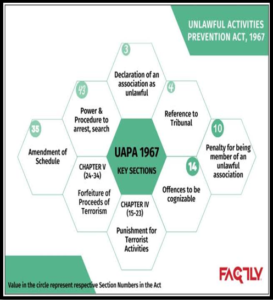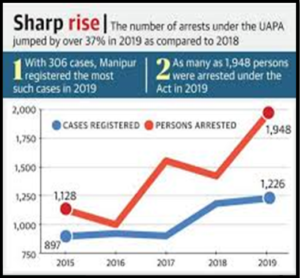AN ANTI-TERROR LAW AND ITS INTERFERENCE WITH LIBERTY
Why in the News ?
- The recent judgement on Fahad Shah case as on November 17, 2023, by the Division Bench of the Jammu and Kashmir High Court has brought attention to the delicate balance between anti-terror laws and personal liberty.
Background:
- Fahad Shah is a journalist who faced multiple legal challenges.
- His release was hindered by allegations in a case involving offences under the Penal Code, Foreign Contribution (Regulation) Act (FCRA), and the Unlawful Activities (Prevention) Act (UAPA) 1967.
- The High Court’s judgement not only granted bail but also questioned the interpretation and application of the UAPA, emphasizing the need for careful consideration in matters of personal liberty.
About Unlawful Activities (Prevention) Act (UAPA) :
Background:
- The UAPA is an advancement from the TADA (Terrorist and Disruptive Activities (Prevention) Act), which lapsed in 1995, and the repeal of the Prevention of Terrorism Act (POTA) in 2004.
- Originally enacted in 1967 to address secessionist movements and anti-national activities.
- Subsequent amendments were introduced in 2004, 2008, and 2013.
- Untill 2004 unlawful activities were limited to actions related to secession & cession of territory.
- 2004 Amendment added “Terrorist act” as an offence under the act.
- Amended most recently in 2019, introducing provisions on terrorist financing, cyber-terrorism, individual designation, and property seizure.
Source: Factly
What is an Unlawful Activity ?
Unlawful activity’ refers to any conduct, whether undertaken by an individual or a group, expressed through actions, spoken or written words, or conveyed through signs or visible representations such that those actions supports or incitie cession or secession of any part of India, or challenges its sovereignty and territorial integrity.
Salient Features of the UAPA Act :
- National Investigation Agency (NIA) Role: Empowers the National Investigation Agency (NIA) to investigate and prosecute UAPA cases nationwide.
- Absolute Power to Central Government: Empowers the central government to declare an activity as unlawful through an Official Gazette.
- Jurisdiction : Applies to both Indian and foreign nationals, regardless of whether the act occurs within or outside India.
- Penalties for Terrorist Acts: Provides death penalty and life imprisonment as the highest punishments for terrorist acts.
- Detention and Bail Provisions: Allows detention without charge or trial for up to 180 days. Denies bail unless the court is convinced of the accused’s innocence.
- Definition of Terrorism: Defines terrorism as acts causing or intending to cause death, injury, property damage, or threats to India’s unity, security, or economic stability.
- Designation of terrorist :
- Union government may proclaim or designate an organization as a terrorist entity based on specific criteria.
- Individuals can also be designated as terrorists on similar grounds.
- Property Seizure Approval: Investigating officers need prior approval from the Director-General of Police for property seizures linked to terrorism. NIA officers require approval from the Director-General of NIA for such seizures.
- Investigation Officers’ Ranks: Permits officers of Deputy Superintendent or above to investigate cases. Empowers NIA officers, Inspector rank or above, to conduct investigations.
Arguments in Favour of UAPA
- National Security:
- Empowers government to prevent and combat terrorism and activities threatening the nation’s security.
- Counterterrorism Measures:
- Comprehensive legislation providing tools to combat terrorism effectively.
- Enables designation of individuals and organizations as terrorists for investigation and prosecution.
- Preventive Detention:
- Allows preventive detention of suspects to prevent potential threats.
- Essential when there may not be enough evidence for a formal trial.
- Global Commitments:
- Aligns with international commitments to combat terrorism.
- Ratification of UN Convention for the Suppression of Financing of Terrorism in 2019.
- Effective Prosecution:
- Facilitates prosecution using modern investigative techniques.
- Used in high-profile cases like the conviction of Ajmal Kasab in the 26/11 Mumbai attacks.
- Deterrence:
- Acts as a deterrent against individuals and organizations engaging in unlawful activities.
- Prescribes severe penalties to discourage participation in activities detrimental to national security.
Arguments Against UAPA
- Violative to Fundamental Rights:
- Violates freedom of expression, assembly, and association.
- Criminalizes dissent and protest, targeting activists, journalists, students, and minorities.
- Lacks Safeguard Mechanism:
- Insufficient safeguards and accountability mechanisms.
- Gives sole discretion to the central government without judicial review, shifting burden of proof to the accused.
- Against Federal Structure:
- Contrary to the federal structure, encroaches upon state powers.
- Undermines autonomy and independence of the NIA, a central agency for counter-terrorism.
- Low Conviction Rate:
- Low conviction rate (2.2% from 2016-2019) indicates ineffectiveness.
- Used to harass and intimidate innocent individuals rather than curb terrorism.
Challenges under UAPA :
Misuse of UAPA
- There are documented instances of UAPA being used in situations unrelated to actual violence.
- Recent judicial decisions, like Thwaha Fasal vs Union of India (2021), have made it easier to obtain bail for those charged under UAPA, indicating a recognition of potential misuse.
Procedural Challenges:
- Section 43-D(5) of UAPA inhibits courts from granting bail if police materials establish accusations as ‘prima facie true.’
- This procedural shift contributes to arrests and detentions, exemplified in Fahad Shah’s case.
Vagueness in Interpretation of Terrorism:
- The vague language of terrorism offences allows the law to cast a wide net, encompassing seemingly innocent acts.
- Fahad Shah’s counsel argued that charges under Section 18 were unsustainable, as the State failed to link publishing an article with terrorist acts.
- The government’s claim that publishing the article harmed India’s reputation as an act of terror faced scrutiny.
No Reciprocation measure:
- It does not address compensation for wrongful arrest, accountability, or redress for years spent in confinement.
Deprivations of Liberty:
- India has a history of arbitrary liberty deprivations, providing courts with tools to safeguard personal liberty.
- Using UAPA to justify arrest for alleged defamation as an act of terror is a recent addition to this history.
High Court’s Observation:
- Defamation debate:
- The High Court rejected the notion that defaming the country equates to terrorism, emphasizing the need for a more grounded interpretation of criminal law.
- Section 43-D(5) Analysis:
- The High Court questioned whether Section 43-D(5) mathematically denies bail whenever accusations are ‘prima facie true.’
- It compared different offences under UAPA, arguing against treating unrelated acts equally under this provision.
- Common-Sense Approach:
- The court highlighted the need for a balanced perspective, distinguishing between active threats and individuals coerced into providing information.
- Section 43-D(5) should not become an insurmountable obstacle preventing release.
- Judicial Discretion Emphasized:
- High Court asserts that law enforcement and the court must apply their minds before arrest and detention.
- Emphasis on ensuring that only cases presenting a ‘clear and present danger’ warrant custody.
Way Forward:
- Narrow down vague definitions of “unlawful activity” and “terrorist act.”
- Exclude constitutionally protected activities like peaceful protests, dissent, and ideological expressions.
- Ensure the burden of proof lies on the prosecution, not the accused. Current UAPA law reverses the normal principle, making it challenging for a fair trial or bail.
- Set up an independent review mechanism to challenge government decisions.
- Address inadequacies in the current process and prevent bias or government influence.
- Restrict UAPA’s use as a last resort, not a first response.
- Avoid suppressing dissent, criticism, or opposition, respecting fundamental rights.
- The need for a more comprehensive legal framework addressing compensation and accountability remains unaddressed.
- Encourage dialogue, negotiation, and reconciliation to address security threats or social unrest.
- Uphold fundamental rights, protecting citizens and fostering peaceful conflict resolution.
The Fahad Shah case highlights the ongoing battle for personal liberty within anti-terror laws. The urgent need for a nuanced legal framework addressing compensation, accountability, and redress for wrongful arrests persists. Securing personal liberty demands a commitment to holding the state accountable and ensuring alignment with constitutional principles through questioning and answering.
Mains Practice Question:
Analyze the strengths and weaknesses of the UAPA in fulfilling its objectives of combating terrorism while protecting individual rights. How can a balance be struck between ensuring security and safeguarding individual liberties?

 Source: Factly
Source: Factly


